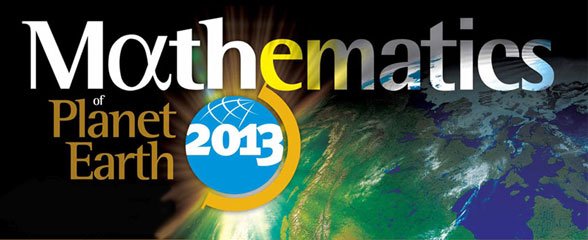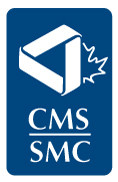 |
 |
 |
 |
 |
 |
CMS MPE2013 Lecture Series
Mathematics has many things to tell us about the world around us; not only about where we are, but whence we came and where we are going. The range of topics is immense, going from the long term evolution of climate to the split-second behaviour of financial markets. As part of an international celebration of the Mathematics of Planet Earth during the year 2013, the Canadian Mathematical Society, in collaboration with the Atlantic Association for the Advancement of Research in the Mathematical Sciences (AARMS), the Centre de Recherches Mathématiques (CRM), the Fields Institute and the Pacific Institute for the Mathematical Sciences (PIMS), is proud to sponsor a cross-Canada series of lectures during the year, given by some of the most eminent experts in the various fields touched upon by this wide theme.
Official website: http://www.mpe2013.org
Scientific audience
General audience
Organizing committee:
Jacques Hurtubise (McGill; CMS)
Lia Bronsard (McMaster; CMS)
Matheus Grasselli (McMaster; Fields)
Bud Homsy (UBC; PIMS)
Charles Lin (Environment Canada)
Jeanette Janssen (Dalhousie; AARMS)
Quotations:
"MPE2013 will draw the attention of thought leaders, policy makers and the general public to the great complexity of the interacting systems of our planet and the profound nature of the techniques needed to understand the dynamics of those systems. Canada can be very proud of the MPE2013 initiative which has gathered world-wide momentum." - Keith Taylor, President of the Canadian Mathematical Society
"Mathematics of Planet Earth 2013 is a worldwide initiative meant to showcase and develop the fundamental role played by mathematics in a huge variety of planetary contexts. Climate change, sustainability, diseases and epidemics, management of resources and risk analysis are important aspects of all this. Mathematics plays a key role in these and many other processes affecting Planet Earth, both as a fundamental discipline and as a key component of multidisciplinary research. PIMS and the other Canadian institutes are proud to have played a leading role in launching this initiative." - Alejandro Adem, Director, Pacific Institute for the Mathematical Sciences
"Our very new institute is happy to participate in the Mathematics of Planet Earth (MPE) project. The statistical sciences play a fundamental role in the collection and interpretation of environmental and population data. To give a few examples: in collaboration with physical scientists and biologists, statisticians use stochastic modeling and statistical analysis to separate signal from noise in vast amounts of climate data, to understand the fluctuations and the movements of wildlife populations, to predict the course of disease outbreaks, and to infer the processes of evolution from genetic sequencing. The MPE2013 project will inspire researchers around the world to become involved with these problems of global importance." - Mary Thompson, Scientific Director, Canadian Statistical Sciences Institute
"Mathematical methods are crucial in understanding the complex interaction between the diverse processes that shape our environment on planet earth. The initiative on MPE is a great way to teach earth’s citizens about the mathematics that lie beneath many discoveries about our planet, and to encourage mathematicians to confront the great challenges that face it. AARMS is proud to lend its support." - Jeannette Janssen, Director, Atlantic Association for Research in the Mathematical Sciences
"Climate change and sustainability of the earth’s environment are challenges that need to be addressed with urgency by scientists in all fields. Mathematicians have a lot to contribute. The world’s mathematics institutes have developed a capacity for interdisciplinary activity, and can bring together researchers across discipline boundaries to help generate new ideas to tackle environmental problems. MPE2013 is a very important initiative." - Edward Bierstone, Director of the Fields Institute
"The Statistical Society of Canada is pleased to join our mathematical colleagues in showcasing what statistics and mathematics have to offer to improve our planet as part of the Mathematics of Planet Earth (MPE) project. Using the understanding of our scientific colleagues from many different fields and the power of the language of mathematics, we can develop random models that explain, for instance, the trajectory of marine animals, how epidemics spread, how climate changes, and so on. The models are then confronted to data leading to improved models and improved understanding. Statistical modelling is crucial to extract the signal from the surrounding noise of the data. In May, Canadian statisticians will convene for their Annual Meeting in Edmonton, Alberta to discuss statistical methodology. This year’s theme of Statistics and the Environment is quite fitting and will be our main contribution to the MPE program." - Christian Léger, President of the Statistical Society of Canada

